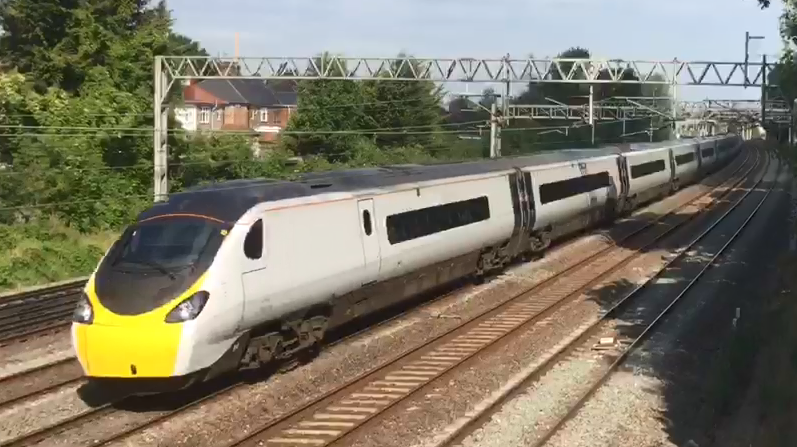
Avanti West Coast uses coasting to keep trains moving
Avanti West Coast runs Pendolino trains without power underneath damaged overhead wires to continue operating planned timetable.
- Working with Network Rail, Avanti West Coast adapts response to overhead line problems by running electric Pendolino trains without traction power
- Avanti West Coast uses coasting for the first time to operate planned timetable
- Pendolino trains coasted along three-mile stretch of West Coast Main Line
Avanti West Coast has operated its Pendolino fleet without power under damaged overhead wires for the first time in order to run its planned timetable.
This method of operation utilised a technique known as coasting, following the discovery of a defect with the Overhead Line Equipment (OLE) near North Wembley – saving thousands of delay minutes and minimising disruption on the West Coast Main Line.
Generally electric trains are unable to pass through these affected areas, as they could significantly damage the OLE, causing extensive disruption. But the inter-city operator worked with Network Rail to arrange for its electric Pendolino trains to coast underneath the damaged section to keep them moving without using power from the overhead wires, until repairs were carried out.
To coast, the pantograph (the apparatus which collects power from the overhead wires) on top of the train was lowered by drivers, so that it was no longer in contact with the wires. This allowed trains to move using their own momentum, for just over three miles without traction power at a speed of 80mph.
Once the train passed the affected area (Harrow & Wealdstone to Wembley Central), drivers simply raised the pantograph to restore power to the train, continuing their journey with speeds of up to 125mph.
This temporary solution, which was in place for five days, enabled Avanti West Coast to operate a full timetable until Network Rail, who are responsible for the overhead wires, could arrange a permanent fix.
As a result, this minimised delays to customers’ journeys that could have been caused by temporary speed restrictions or cancellations, if this response had not been adopted.
👷🏿♂️Our teams worked over this weekend to resolve a fault on overhead electric lines at #NorthWembley⚡️
— London Euston (@NetworkRailEUS) August 10, 2020
Although there were some delays🚉 we made changes to keep passengers moving until this issue could be fixed ⚒
Here’s what we did ⬇️@CalSleeper @AvantiWestCoast @LNRailway pic.twitter.com/hHM4ogjG1D
Initially when the damage to the wires had been detected, a speed restriction of 20mph was imposed to reduce further damage or risk of failure to the OLE. By making use of the ability to coast, trains could travel at a much faster speed – significantly reducing the impact to customers and saving thousands of delay minutes+.
Gus Dunster, Executive Director of Operations at Avanti West Coast, said: “Working with Network Rail we adapted our response to the overhead wire issues near North Wembley by coasting – a technique we’ve been trialling that enables our Pendolino trains to move along the line without electrical power. This is the first time we have used coasting to operate a full timetable and is a great example of our collaborative efforts to put customers at the heart of everything we do.
“By utilising our ability to coast we were able to keep our trains moving through the affected area, minimising the impact to customer’s journey and preventing further damage to the overhead wires.”
Phil Barnes, Head of Operations at Network Rail, said: “Last month, condition monitoring equipment on a London Northwestern Railway train alerted us to a fault on the overhead line equipment in the neutral section in North Wembley.
"North Wembley is a complex part of the West Coast main line. There are several crossovers for freight and passenger trains and (pre-Covid) about a thousand train movements a day. In order to complete our repairs, we need to close all six lines for at least 10 hours.
"Working with Avanti West Coast and London Northwestern Railway, we arranged for trains to coast on the fast lines through the impacted area, until we could complete the repairs overnight on the Saturday. This kept trains moving and minimised disruption to passengers.”
ENDS
+ The defect with the OLE resulted in 1,385 delay minutes. An additional 196 delay minutes were caused by initial issues with the coasting operation. In comparison, a dewirement at North Wembley in March resulted in 9,100 delay minutes to Avanti West Coast customers (when coasting was not used). Therefore, the method of coasting saved around 7,500 delay minutes.
Contact Information
Notes to editors
Notes to Editors
Due to a backup facility on the Pendolino train, power is still available onboard the train when it is coasting.
About Avanti West Coast
Avanti West Coast, operator of intercity rail services on the West Coast Main Line, is a joint venture between FirstGroup and Trenitalia, delivering a cleaner, greener railway that drives the West Coast forward.
We’re on a mission to revolutionise train travel, linking together the towns and major cities of the UK to create an iconic railway the country can be proud of. We’ve got big plans including a fleet of new intercity trains, as well as the complete refurbishment of the existing Pendolino train fleet. We will introduce more train services every week with new routes added, and a much-improved onboard service with enhanced free Wi-Fi, plug sockets, 25,000 brand new seats and improved catering. Since 8 December, passengers have benefitted from improved passenger compensation, available for journeys delayed by just 15 minutes.
For the latest news, visit the Avanti West Coast Media Room: https://newsdesk.avantiwestcoast.co.uk/
Press Office: 0845 000 3333
